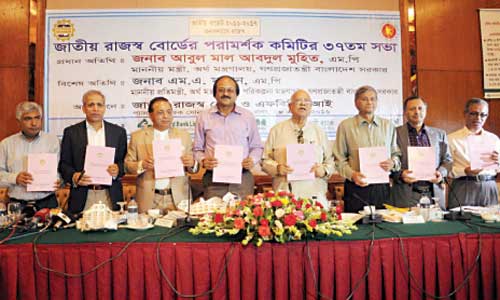Muhith confirms 15pc flat VAT under next budget
Finance minister Abul Maal Abdul Muhith on Thursday said the government in the upcoming budget would introduce a flat 15 per cent value-added tax in line with the new VAT law, ignoring pleas of businesses to set different VAT rates for different sectors and to continue with the current VAT package for small traders.
At the 37th consultative committee meeting jointly organised of the National Board of Revenue and the Federation of Bangladesh Chambers of Commerce and Industry at Hotel Sonargoan in Dhaka, the finance minister, however, said they might move to differential VAT rates by the end of the current government’s tenure.
Muhith said education and health sectors would get higher allocations and priority in the budget for the fiscal 2016-2017, instead of the transportation and energy sectors as in the previous years.
The government is going to implement the new VAT and Supplementary Duty Act-2012, formulated in line with a prescription of the International Monetary Fund, from July 1 this year.
Traders have been protesting strongly against the flat rate of 15 per cent VAT and threatening agitation against it.
Muhith at the meeting
said, ‘I want to tell you that this time we will keep the VAT rate at 15 per cent in the next budget and continue it for some period.’
Differential VAT rates can be introduced for some sectors after grading the products, he said, adding, ‘I can’t promise it now, but by the end of the tenure of the current government we can move to differential rates.’
It will not create any problems for businesses, if they maintain their sales records properly and improve the accounting system, the minister said.
‘So, it is my humble request to you to comply with 15 per cent VAT rate and improve your accounting system, so that VAT is imposed only on value addition,’ Muhith said.
Regarding the priority in the next budget, the finance minister said it was education and health which will get higher allocation.
He also predicted that uninterrupted power supply will be guaranteed by the end of 2018.
Muhith said he wanted to place a budget for the next year aiming to achieve a higher growth rate through increasing the domestic demand.
Regarding the tax structure, he said there should be a guarantee for businesses on stability about the rates of taxes and duties, so that they could prepare their business plans.
FBCCI president Abdul Matlub Ahmad sought a pro-business and pro-industry budget for the next year without extra tax burden on businessmen.
He also sought continuation of supplementary duty on imports of finished goods to protect the domestic industry.
To the NBR, Matlub proposed to rationalise the tariff structure for eliminating inconsistencies in the duty process for import of raw materials.
Matlub demanded setting the electricity price at Tk 5 to Tk 6 a unit until gas supply is ensured.
The FBCCI chair also urged the government to give attention to reducing the fuel prices in a way that can help minimise the costs of doing business.
He also recommended formulation of an electricity price fixation policy and boosting regional connectivity to improve electricity generation.
The FBCCI also demanded introducing a permanent duty structure and imposing only 1 per cent duty on import of capital machinery and basic raw materials, 3 per cent duty on intermediary goods, 10 per cent on intermediary raw materials and essentials goods, and 25 per cent on finished goods.
State minister for finance and planning M A Mannan, NBR chairman Md Nojibur Rahman, FBCCI first vice-president Shafiul Islam, vice-president Mahbubul Alam, Bangladesh Women Chamber of Commerce and Industry president Selima Ahmad, and Bangladesh Jewellery Association president Kazi Sirajul Islam, among others, took part in the consultation.
News Courtesy: www.newagebd.net











